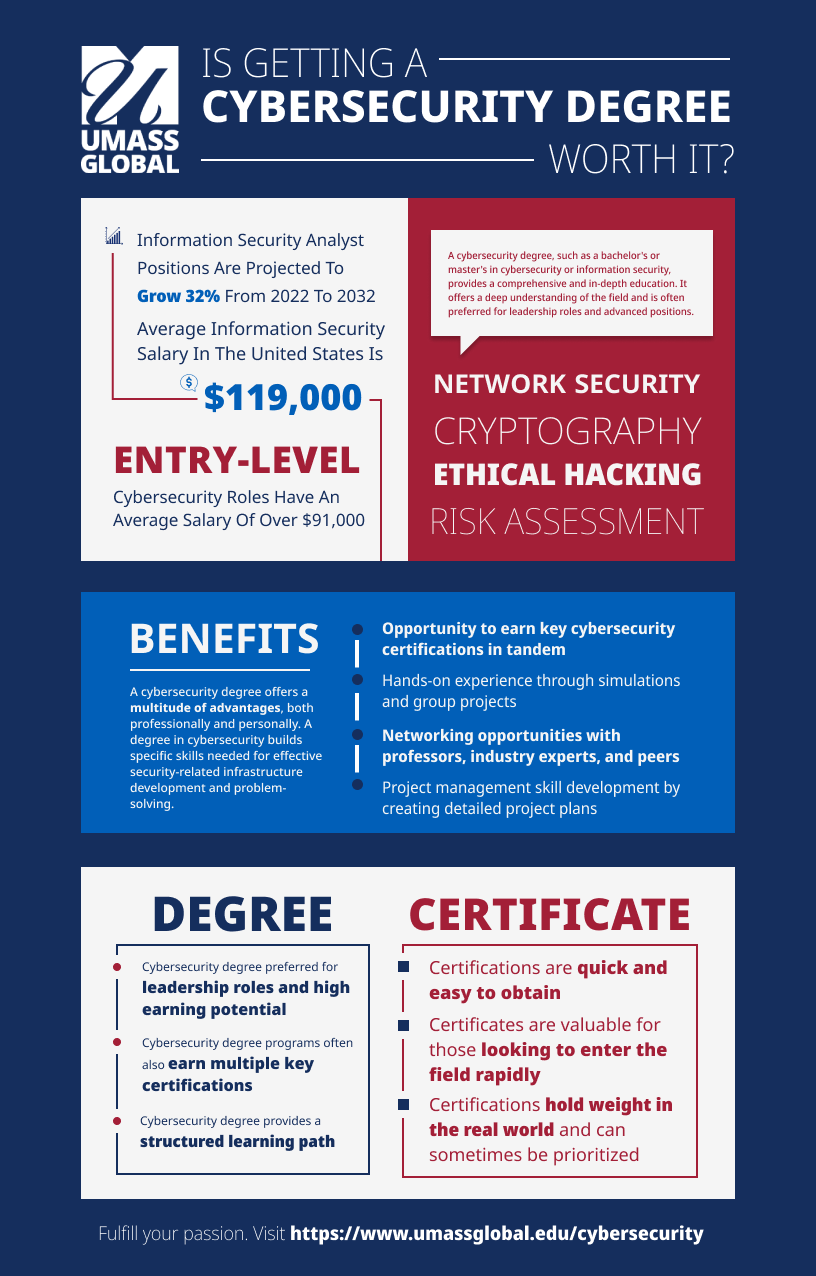Explore our resources for technology degrees, like IT and Cybersecurity, and learn about career options that fit your future.

In our increasingly interconnected world, the importance of cybersecurity has grown exponentially. With cyber threats becoming more sophisticated and prevalent, the demand for skilled professionals in the field has skyrocketed. As a result, many individuals are contemplating whether pursuing a cybersecurity degree, either through traditional or online programs, is worth the investment. In this blog post, we'll explore the value of a cybersecurity degree and shed light on whether it's a worthwhile career.
Gain insights into the advantages of pursuing a bachelor’s degree in Cybersecurity with our comprehensive blog and infographic. Our infographic contains multiple facts and statistics that you can refer back to as you finalize your major.
Cybersecurity Industry Job Growth
Cybersecurity has emerged as a critical aspect in our digital landscape, with businesses, governments, and individuals all relying on secure online environments. The proliferation of data breaches, ransomware attacks, and other cyber threats has created a pressing need for experts who can protect sensitive information and infrastructure.
While many believe that a general Bachelor of Information Technology can help secure a high paying role in the cybersecurity industry, a bachelor’s in cybersecurity is a more focused degree. These two degrees have overlapping areas, but a BS in cybersecurity dives deeper into the areas of encryption, risk management, digital forensics, and ethical hacking while an IT degree provides broader knowledge on hardware, software, and networking.
This high demand for cybersecurity professionals has translated into promising career prospects. According to the Bureau of Labor Statistics, the employment of information security analysts is projected to grow by 32% from 2022 to 2032, which is faster than the average across all occupations. This growth indicates a robust job market for those with a cybersecurity degree skill set.
Benefits of a Cybersecurity Degree
A cybersecurity degree offers a multitude of advantages, both professionally and personally. A degree in cybersecurity can help you secure specific skills needed for effective security-related infrastructure development and problem solving. It also can ensure you can earn a high paying role even at the beginning of your career. Some of the key benefits of a cybersecurity degree include:
- In-depth Knowledge: A cybersecurity degree program provides comprehensive training in various aspects of the field. You'll learn about network security, cryptography, ethical hacking, risk assessment, and more. This depth of knowledge equips you with the skills to effectively understand and combat evolving cyber threats.
- Professional credentials: Earning a degree in cybersecurity adds credibility to your resume. Employers often prefer candidates with formal education in the field because it demonstrates a commitment to cybersecurity and a foundational understanding of the subject matter. Having additional cybersecurity certifications is also a plus which can be earned as part of your degree program.
- Hands-on experience: Many cybersecurity degree programs include practical, hands-on experience through simulations and group projects. These opportunities allow students to apply their knowledge in real-world scenarios, enhancing their problem-solving and critical-thinking skills. Many internship opportunities are also available to college students to further this hands-on experience.
- Networking opportunities: Attending a cybersecurity program, whether online or in person, provides valuable networking opportunities. You can connect with professors, industry experts, and fellow students who may become valuable contacts throughout your career.
- Project management skills: A Bachelor of Science in Cybersecurity provides a robust foundation in project management, improving your ability to create comprehensive project plans tailored to the unique demands of safeguarding sensitive information. At UMass Global we offer an emphasis in project management alongside our cybersecurity degree program that helps you gain knowledge in identifying risks, implementing mitigation strategies, and coordinating multifaceted teams.
Cybersecurity Professional Salary Potential
Cybersecurity job salaries have been steadily on the rise in recent years, reflecting the demand for skilled cybersecurity professionals and resulting in competitive compensation packages. As organizations recognize the critical nature of cybersecurity in today's landscape, many are willing to invest in their security teams, offering not only substantial base salaries but also bonuses and benefits to retain top talent.
The average information security salary in the United States is $119,000 with the salary range increasing and decreasing depending on the industry. Cybersecurity jobs also offer competitive compensation for entry-level roles, with an average salary of over $99,000.
Cybersecurity Certificate vs. Degree
Cybersecurity degrees and certificates both play essential roles in preparing individuals for careers in the field, but they serve different purposes and have distinct advantages. A cybersecurity degree, such as a bachelor's or master's in cybersecurity or information security, provides a comprehensive and in-depth education covering a wide range of topics, including network security, cryptography, risk management, and ethical hacking. It offers a deep understanding of the field and is often preferred for leadership roles and advanced positions.
On the other hand, cybersecurity certificates, such as CompTIA Security+, Certified Information Systems Security Professional (CISSP), or Certified Ethical Hacker (CEH), are focused on specific skills and knowledge areas. They are quicker to obtain and can serve as a practical way to gain specialized expertise in a particular cybersecurity niche. Certificates are valuable for those looking to enter the workforce rapidly or for experienced professionals seeking to validate their skills.
In the end, the choice between a degree and certificates depends on an individual's career goals, the depth of knowledge they seek, and their desired career trajectory within the cybersecurity field. Many professionals combine both degrees and certificates to create a well-rounded skill set.
Is a Cybersecurity Degree Worth It?
Whether a cybersecurity degree is worth pursuing depends on individual circumstances and career goals. A cybersecurity degree can provide several advantages, including a solid foundation in core concepts, hands-on training, and the opportunity to build a professional network. It can also make you a more competitive candidate for certain positions and offer a structured learning path.
However, it's essential to consider factors such as the cost of tuition and the time required to complete the degree. In the rapidly evolving field of cybersecurity, certifications and practical experience often hold significant weight, and some employers may prioritize these over formal degrees. This is why a cybersecurity degree program that helps you work toward common certifications is the most ideal path towards a successful career in information security.
Secure Your Future: Making the Right Choice in Cybersecurity Education
In the ever-evolving cybersecurity landscape, a degree can be a valuable asset. It equips you with the knowledge, skills, and credentials needed to excel in this critical field. Whether you choose a cybersecurity degree online or a traditional program, the decision should align with your goals, lifestyle, and learning preferences.
UMass Global offers a Bachelor of Science in Cybersecurity that covers both the computer science of information security as well as the fundamentals of developing secure software and systems. Additionally, for those that currently hold industry-standard cybersecurity certifications you are able to substitute courses that align with your certification.
If you are ready to start your journey in cybersecurity, request more information about our comprehensive Cybersecurity degree program or apply today.









